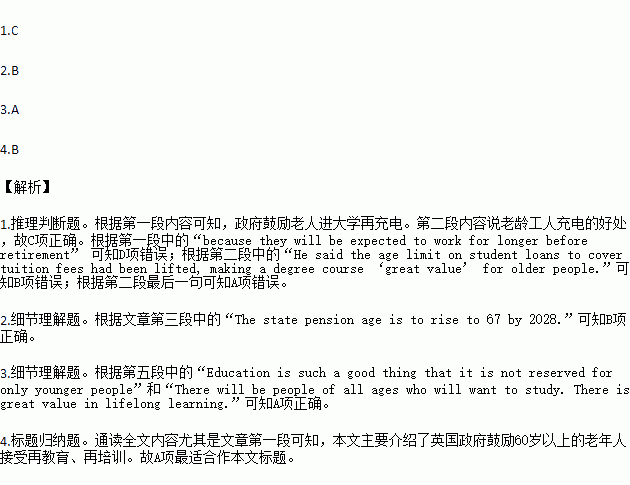题目内容
People in their sixties should go to university to retrain because they will be expected to work for longer before retirement, the Government has suggested.
Older workers who take courses to keep their skills up-to-date will be more likely to keep their jobs, claims David Willetts, the higher education minister. He said the age limit on student loans to cover tuition fees had been lifted, making a degree course “great value” for older people. His comments followed a government report which found that the country's future economic success would depend on the skills and contributions of older workers.
One in four people will be older than 65 by 2033 and economists have warned thatthe ageing population will place a heavy burden on taxpayers unless more people work for longer. The state pension age is to rise to 67 by 2028. Ministers have warned that they have no idea when younger workers in their thirties will be able to retire.
Mr Willetts, who is accompanying David Cameron in India, urged workers older
than 60 to give further education serious consideration.“There is certainly a
pressure for continuing to get retrained and upskilled,”he said.“Higher education has an economic benefit in that if you stay up-to-date with knowledge and skills you will be more employable.”
Mr Willetts said a university course had “wider” benefits, making people more likely to lead healthy lives.“Education is such a good thing that it is not reserved for only younger people,” he said.“ There will be people of all ages who will want to study. There is great value in lifelong learning.” Under previous rules, students in England would get a loan to cover tuition fees only if they were younger than 54.
Latest figures showed that only 1,940 undergraduates starting courses last year were older than 60, out of a total of 552,240 students in Britain. Some 6,455 were aged between 50 and 60, according to the Higher Education Statistics Agency.
1.We can learn from Paragraphs 1 & 2 that older workers ________.
A.have no chance to get a loan to cover tuition fees
B.may hold back the country's future economic success
C.are encouraged to go back to university and retrain
D.should be retrained after retirement
2.According to the passage, a person who is over ________ years old can draw a
pension in 2028 in Britain.
A.54 B.67 C.65 D.60
3.What does Mr Willetts think of education?
A.People of all ages can receive different education.
B. There is no need for workers older than 60 to receive further education.
C.University courses have nothing to do with a healthy life.
D.Education is only provided for younger people.
4.What would be the best title for the passage?
A.Britain: entering the ageing state
B.Over60s are told: go back to university and retrain
C.The situation of education in Britain
D.The system of pension in Britain
 小学生10分钟口算测试100分系列答案
小学生10分钟口算测试100分系列答案
